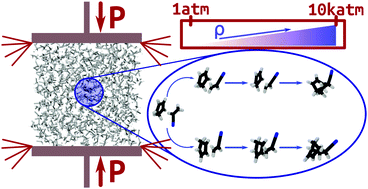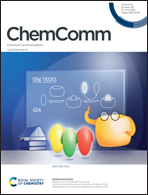Solvation effects drive the selectivity in Diels–Alder reaction under hyperbaric conditions†
Abstract
High pressure effects on the Diels–Alder reaction in condensed phase are investigated by means of theoretical methods, employing advanced multiscale modeling approaches based on physically grounded models. The simulations reveal how the increase of pressure from 1 to 10 000 atm (10 katm) does not affect the stability of the reaction products, modifying the kinetics of the process by lowering considerably the transition state energy. The reaction profile at high pressure remarkably differs from that at 1 atm, showing a submerged TS and a pre-TS structure lower in energy. The different solvation between endo and exo pre-TS is revealed as the driving force pushing the reaction toward a much higher preference for the endo product at high pressure.



 Please wait while we load your content...
Please wait while we load your content...